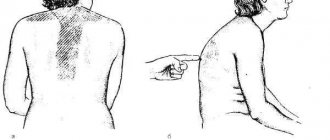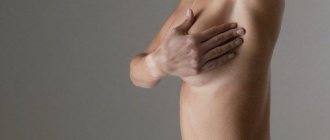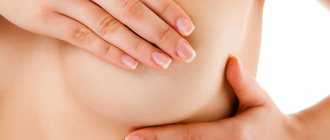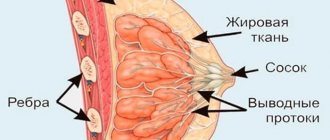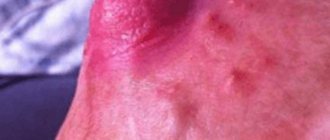According to statistics, about 95% of women feel pain and swelling in the mammary glands before menstruation. In most cases, when breasts swell before menstruation, there are physiological causes and the symptom is not pathological. However, carelessness in this situation is not acceptable, since many breast diseases can manifest as pain in the breast.
How sex hormones work
The first phase of the cycle begins immediately after the end of menstruation. During this period, under the influence of estrogen, the next egg begins to mature. Around day 15–16, the follicle ruptures, the egg is released, and in the place of the burst follicle, the corpus luteum begins to function, which secretes progesterone. From this moment on, changes occur in the body - the breasts become engorged and begin to ache, the lining of the uterus prepares for the implantation of a fertilized egg, so it also becomes loose and engorged with blood. During this period, painful sensations in the lower abdomen and ovaries are possible.
If fertilization does not occur, the mucous membrane is rejected and comes out in the form of menstruation, and the cycle begins to repeat itself.
What determines the intensity of pain?
Some women do not even feel discomfort in the bust area, but for the other half this is a serious problem. Sometimes sleep is disturbed due to pain, so you have to consult a doctor.
The strength of discomfort depends, first of all, on the psychological state of the patient. There are more and less sensitive women.
There are other features:
- Breastfeeding mothers experience pain less frequently than those who have not used this method of feeding. Such patients are not bothered by mastopathy.
- Women with sports training do not feel not only chest pain, but also pain in general.
- Stress and difficult life situations lead to inconvenience and pain, and positive emotions and calm reduce such feelings.
Thus, we can say that the strength of chest discomfort is directly related to the mental and physical state of the patient - the level of mental stress and general well-being.
Discomfort before menstruation
Discomfort in the lower abdomen and pain in the chest begin about a week before the onset of menstruation. This condition may continue until the end of menstruation or go away immediately after it begins.
Symptoms that are characteristic of premenstrual symptoms:
- lower back pain that can radiate to the tailbone;
- lethargy, weakness, possible migraine attacks;
- from the mental side - irritability, increased sensitivity;
- Before menstruation, the mammary glands hurt and become enlarged.
The norm is a slight deterioration in well-being, which does not affect performance or mood. If hormonal status is disrupted, symptoms may intensify. In this case, it is necessary to find out the reason. If you don’t want to undergo treatment, you can simply take homeopathic plant-based medicines for several months. Symptoms will decrease, and you will feel better before your period.
It is considered normal if both mammary glands ache. Since the alveoli and ducts are fully formed by prolonged exposure to progesterone, which only occurs during pregnancy, short-term exposure can cause discomfort. After giving birth and breastfeeding for at least 6 months, breast tissue becomes fully formed and painful sensations before menstruation may become less.
Hormonal imbalances and irregular cycles
If the body's hormonal balance and the production of necessary substances are disturbed, then the breasts will hurt for a long time. One of the main causes of chest pain during menstruation is hormonal imbalance.
Often, a failure in the production of necessary hormones is associated with stress. A woman’s body is less stress-resistant, so it reacts very sharply to the slightest fluctuations in the emotional background.
Stress causes insomnia, depression and has an extremely negative effect on the functioning of all body systems.
Under stress, menstrual irregularities are often observed. Irregular onset of menstruation can be associated with overwork. Sometimes it is enough to have a good rest and sleep, reduce the workload so that the monthly cycle normalizes and the body begins to function without problems.
Various gynecological pathologies can lead to breast pain during menstruation. This is due to the fact that the functioning of the genital organs and the functions of the mammary gland are closely interrelated. The female gland reacts sharply to pregnancy.
It may hurt throughout your period and even longer. Severe discomfort can be felt at any age - during menopause, late menstruation, pregnancy. Pathology can also occur in adolescents.
Pathologies that cause pain in the paired organ:
- Breast cyst
- Mastitis
- Ovarian cyst
- Endometriosis
- Uterine fibroids
- Tumors in the mammary gland
The disease disrupts the production of hormonal substances, causing a disruption in the levels of estrogen and progesterone. Chest discomfort increases, and with further development of the pathology, the unpleasant sensation intensifies.
Characteristic symptoms of the disease are frequent or periodic pain in the chest of great intensity, heaviness inside the mammary glands, secretion from the nipples. Both young girls and mature women can get sick.
With a breast cyst, discomfort in the chest resembles a burning sensation. It intensifies during menstruation. A cyst rarely develops into cancer, but requires constant treatment and monitoring. You need to see a doctor at the first signs of pathology.
Unpleasant sensations in the chest are also observed with mastitis. A dangerous process occurs when breastfeeding is abandoned. Discomfort may also develop in the first week after birth, when breastfeeding is not properly established. The baby may have difficulty sucking milk; stagnation of milk forms in the breast ducts, which causes pain and the onset of mastitis. It is important to continue breastfeeding and expressing milk.
With an ovarian cyst and uterine fibroids, tingling appears not only in the chest, but also in the lower abdomen.
The neoplasm begins to compress the surrounding tissue, receptors and nerve endings react with acute pain to this process. With various gynecological diseases, a woman’s chest tingles and burns. The gland often swells and heaviness is felt. Cells can change and cancer occurs.
A tumor in the mammary gland or genital organs can be benign or malignant. In oncology, a developing tumor can be detected using palpation and various diagnostic methods.
When does your chest start to hurt?
Symptoms of PMS begin to bother a woman depending on the length of the cycle. For some it is 28 days, for others it is 30 - 35 days. Accordingly, ovulation can occur on the 15th or 20th day. After this, the dominant hormone changes in the body and tissues that have receptors for them begin to respond to the changes.
It is considered normal if changes begin 2 weeks before the start of menstruation. Some people experience breast pain a week before their period.
The intensity of pain depends on many factors:
- Age – in young nulliparous women, these processes occur more pronouncedly, since the mammary gland is fully formed only after lactation.
- Having excess weight. In obese women, swelling is more pronounced, so the connective tissue of the mammary glands is more compressed by the glandular tissue.
- Health status of the pelvic organs. Chronic infections can worsen PMS.
- The quality of sexual life, its regularity. Stagnation of blood in the pelvis complicates the course of menstruation and the process of preparing for it.
- The state of the endocrine system is the quantity and quality of hormones of the thyroid and pancreas, pituitary gland and hypothalamus, adrenal glands.
- Lifestyle, bad habits, passion for caffeine-containing drinks.
- Individual pain sensitivity.
If a woman has recently had an abortion or has had a miscarriage, the condition of the endocrine system worsens, a malfunction occurs in the functioning of the sex glands - excessive or, conversely, insufficient synthesis of any hormone.
Therapy and prevention
Treatment of pain depends on the identified causes of its occurrence and the established diagnosis. The therapeutic course is aimed at correcting hormonal levels, eliminating stress, and restoring metabolism.
In the presence of an infectious-inflammatory process or neoplasm, the prescription of non-steroidal anti-inflammatory drugs and medications of other drug groups will be required.
In the presence of nodes, cysts or tumors, surgery is used. The operation is based on removing the painful focus. In some cases, complete removal of the mammary gland will be required. Cancers are also treated with chemotherapy and radiation.
To prevent pain in healthy breasts from appearing during menstruation, it is necessary to adhere to some preventive measures. Important:
- Periodically perform a breast self-examination in front of a mirror.
- Monitor your menstrual cycle
- Wear the right bra
- Lead a healthy lifestyle
- Eliminate stress from life
A contrast shower can improve blood circulation in the mammary glands. Water jet massage is an excellent prevention of breast diseases. To strengthen muscles, it is useful to exercise and exercise in moderation.
Wearing the right bra plays a big preventative role. Underwear prevents the development of the disease; it supports the breast tissue in the desired position.
Physiological causes of pain
Balance of estrogen and progesterone
Estrogen and prolactin are two hormones that stimulate breast growth. Estrogen exerts its influence in the first phase of the cycle; it is also dominant during adolescence, causing tissue to grow. Prolactin is activated in the second phase of the cycle, when the likelihood of fertilization of the egg and pregnancy is potentially high.
Prolactin stimulates lactocyte cells to produce milk. It is prolactin that has the greatest effect on glandular cells, and they increase in size and accumulate fluid. If the level of prolactin is normal and does not exceed 15 - 20 nanograms per 1 ml of blood, changes in the body are considered normal and are not dangerous to health. Its excess is associated with improper functioning of the pituitary gland, and possibly a tumor - prolactinoma, if the woman is not pregnant or breastfeeding.
To determine the amount of sex hormones, it is necessary to do a blood test. Based on its results, you can judge how correctly the ovaries and pituitary gland are working. It happens that PMS symptoms are minor, but prolactin levels are dangerously elevated. This is not normal and the cause must be determined. Typically, women who complain of infertility have high levels of prolactin. This is explained by the fact that a malfunction has occurred in the body, and the reproductive system is mistakenly in a state of lactation, while in some women menstruation stops completely or the egg simply does not mature.
How is pregnancy related to breast pain?
In women with irregular menstrual cycles or hormonal imbalances, ovulation does not always occur in the middle of the cycle. In this case, you can get pregnant almost before your period and not know about it for some time.
After menstruation has ended, a woman may notice that her breasts are still full and sore. Thus, it can be assumed that she became pregnant. It is worth taking a pregnancy test and going to the gynecologist.
Pathological causes of pain
Excess prolactin
Excess prolactin has a detrimental effect on a woman’s psyche and behavior. At the same time, she may realize that she is behaving incorrectly, but she cannot help herself. Symptoms of excess prolactin include:
- Depressive state, tearfulness, irritability, inexplicable.
- Poor functioning of the thyroid gland, as a result of which metabolism is disrupted and excess weight accumulates, even if the woman does not overeat. This is due to a malfunction of sex hormones that affect thyroid function.
- Infertility due to lack of ovulation, because prolactin inhibits the production of estrogen, which is responsible for the maturation of the egg.
- Severe pain in the mammary glands. Long-term hyperprolactinemia can cause mastopathy - the formation of benign tumors or, at the first stage, the proliferation of connective tissue.
- Secondary amenorrhea is the absence of menstruation due to the dominance of prolactin.
- Sleep disturbances, as a large amount of the hormone is produced at night.
- Impaired memory and vision due to a pituitary tumor, which is formed from prolactin-producing cells.
Another reason that before menstruation the mammary glands begin to ache more than usual is an excess of estrogen and a lack of progesterone. Normally, these two hormones balance each other. If for any reason more estrogen is produced and this happens for a long time, symptoms of mastopathy may appear. In this case, the breasts will hurt not only before menstruation - the discomfort will become constant.
Estrogen stimulates tissue growth; progesterone, on the contrary, inhibits this process. Its deficiency in the second phase leads to constant dominance of estrogen and uncontrolled proliferation of the glandular, fibrous or cystic component.
The cause of estrogen dominance may be problems with the liver, since hepatocytes are responsible for breaking down the hormone in the second phase of the cycle. If the organ is not working well, excess estrogen circulates in the blood and causes non-cyclical, constant pain in the mammary glands.
Ambulance
There are situations that require immediate contact with a specialist:
- The pain syndrome has a wave-like appearance, when one breast hurts, then the other;
- Painful spasms;
- Nipple discharge;
- Strong pain;
- The color of the skin and its structure have changed;
- The nature of the pain, compared to other cycles, has a different intensity;
- Among other things, if your breasts hurt not only before your period, but also on other days of your cycle, this is a good reason to visit a doctor.
Another reason could be pregnancy. Swelling, sensitivity of the mammary glands, nipples that cannot be touched - all this may be the first sign of an interesting situation.
Dear women, value your women's health, no one will do this but you.
How much do breasts hurt before menstruation?
Each organism is individual. Depending on the woman’s hormonal status, as well as the presence of concomitant diseases, chest pain before menstruation may last until it ends, or may disappear a day or two after it begins.
If a woman or girl is worried about her health, she needs to donate blood for sex hormones and consult a gynecologist: is everything normal or are there problems. If the indicators are normal, there is no need to worry about such a reaction of the body; for pain relief, it is enough to drink a medicine.
What is the treatment
When breast pain is insignificant and the discomfort goes away quickly, treatment will not be prescribed. Mastopathy is accompanied by constant pain. Moreover, it can be diffuse, when the enlargement and thickening of the breast is uniform, or fibrous. The woman will feel heaviness and fullness in the chest, the nipple becomes painful. Since the disease is provoked by endocrine disorders, the woman is prescribed medications to stabilize her hormonal levels.
To effectively eliminate the problem, you will need to balance your diet, adjust your drinking regime, and select comfortable, non-traumatic clothing.
If the pain is caused by pathological processes, then the disease that provoked the symptoms is treated.
How to Perform a Breast Self-Examination
Self-examination of the mammary glands is the best way to prevent problems that can be minor or can seriously undermine your health. A breast examination should be performed once a month. Due to the fact that cancer has become much younger, everyone needs to do this, even teenagers.
The procedure is simple: first, the areolar-papillary area is palpated for the presence of any lumps, then each segment where the lobes of the mammary glands are located is probed with fingers from the base of the breast. Particular attention should be paid to the upper outer quadrant - this is where the most glandular tissue is located and the risk of tumor is greater.
You can conduct a self-examination in the bathroom or in front of a mirror. If a mobile lump or immobile tumor is detected, you must immediately contact an ophthalmologist to clarify the nature of the neoplasm.
What is self-examination
Recently, cases of benign and malignant breast diseases have become more frequent. According to WHO statistics, they are diagnosed in 60% of women of all ages. The most insidious is cancer, since it is asymptomatic for a long time, and pain appears only at a mature stage, when long and exhausting treatment is required.
In this regard, every woman is required to master the self-examination technique and conduct it every month from the 7th to the 10th day of the menstrual cycle (day 1 is the beginning of menstruation). During this period, the breasts, as a rule, become soft and painless again.
The self-examination technique is quite simple:
- Stand in front of a mirror and examine the skin of your breasts, nipple and areola area. They must have an even color and structure, be clean, without rashes. Both breasts should be symmetrical. Nipple retraction, peeling of the skin, changes in the shape of the mammary gland are symptoms of the disease.
- Raise one hand behind your head and palpate the breast from the base to the nipple. The presence of compactions and round formations that easily move under the fingers is assessed. Also examine another gland.
- Place your hands on your belt, tense and then relax the muscles of the front wall of your chest. Carry out inspection and palpation.
- Hold the nipple between your thumb and index finger and squeeze lightly. Pay attention to whether liquid flows from the nipple and what color the discharge is - transparent, cloudy, mixed with pus or blood.
- Lie on your back and relax, palpate each breast in turn and the axillary lymph nodes.
Palpation should be carried out not with the pads, but with the entire upper phalanx of the fingers. It is advisable to record the results of the self-examination in a diary. Doctors also recommend regularly inspecting the inner surface of the bra to see if there are any traces of discharge there.
Consultation with a gynecologist
At an appointment with a gynecologist, various information is clarified for an accurate diagnosis.
If the mammary glands hurt before menstruation and this causes alarm, for example, if a woman is over 35 years old or is in menopause, this should be alarming. It is during these periods that most problems with the mammary glands are discovered. An examination and consultation will not hurt. Especially if there are reasons for this:
- Hereditary predisposition to tumors of the reproductive system, which is confirmed by genetic examination.
- No children under 35 years of age.
- History of abortion or miscarriage.
- Disorders of the thyroid or pancreas, adrenal tumors.
- Early manifestations of menopause.
An early identified dangerous disease is easier to cure than its advanced form.
Diagnostics
A mammologist and a gynecologist conduct a general examination, palpate organs, and collect anamnesis. If pathology of the mammary glands or female reproductive organs is suspected, an ultrasound examination or mammography is performed. If in this way it is not possible to establish why the chest hurts during menstruation, a blood test for hormones will be needed to determine the ratio of these substances. Sometimes it is in this way that it is possible to identify a diagnosis, for example, unexpressed ovarian multifolliculosis.
What to do if your chest hurts
If, after consulting a doctor and taking tests for sex hormones, no deviations from the norm are found, nulliparous women are recommended to take painkillers at the moment when the breasts begin to hurt.
If a hormonal imbalance is detected - hyperprolactinemia or progesterone deficiency - this condition must be corrected. The safest way is homeopathy. The drug Matsodinone is the most popular of its kind, as it contains plants that reduce the synthesis of prolactin and estrogen. Another group of plants adds phytohormones - analogues of progesterone. Taking the drug is quite long: at least 3 months. There is a gentle normalization of the processes of the reproductive system.
Other causes of breast swelling
There are other reasons why the mammary glands swell before menstruation. They may be associated not only with hormonal fluctuations.
The following phenomena may serve as provoking factors:
- drinking large amounts of liquid;
- use of hormonal contraception;
- wearing tight underwear;
- eating a lot of salt;
- excessive consumption of coffee and other caffeinated drinks;
- taking certain medications;
- diseases of the female genital organs;
- surgical interventions.

